Politics
Otti orders investigation as Fire Service officials switch off phones during fire disaster in Aba
Published
3 weeks agoon
By
Ekwutos Blog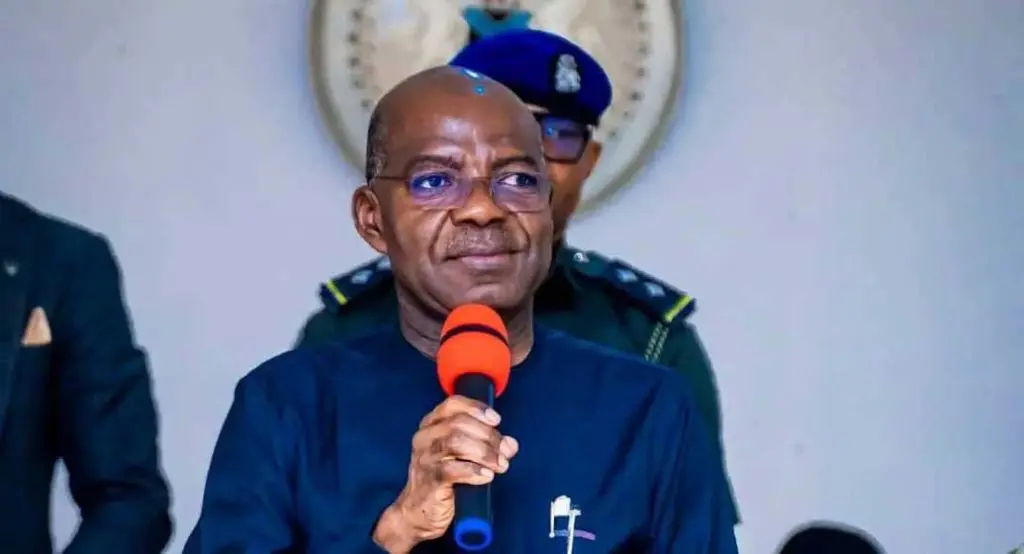
Governor Alex Otti of Abia State has directed his Senior Special Assistant on Homeland Security to carry out an investigation to find out what actually led to the inferno that engulfed a two-storey building at 73 Lagos Street Aba, this week.
This is as he expressed dismay that the phone numbers of Fire Service officials in Aba were reportedly switched off when the fire was ravaging the building.
Otti, who paid a visit to the victims on Friday, commiserated with them and promised that his administration would assist them and provide temporary accommodations for them.
He thanked God that no life was lost and stressed the need for every household to have a fire extinguisher, and directed that henceforth, there is going to be enforcement of compulsory fire extinguisher in all households.
He directed that a thorough investigation should be conducted to ascertain why the phone numbers were off during such an emergency and to determine if the inferno was natural or the carelessness of the occupants.
“It’s quite unfortunate that the fire service could not come on time, normally they arrive within ten minutes and I am surprised the way this one turned out.
“I have directed them to do a thorough investigation to ascertain why the phone numbers of fire service officers were off during the fire outbreak.
“I need to get a report about the fire service officers and why their phones were put off and this whole place burnt down completely,” Otti fumed.
Narrating their ordeals, the landlord of the building, Mr. Vincent Uzuegbu, his family and a tenant in the building, Mr. Obinna Obi and his wife, said that they were asleep when the fire started, adding that they lost everything.
You may like
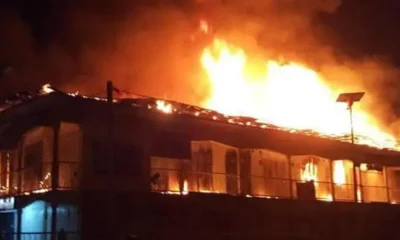

Fire guts staff quarters at Sa’adu Zungur University, Bauchi
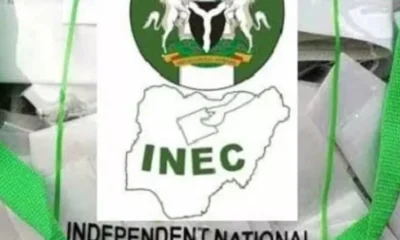

2027: INEC moves to strip president’s power to appoint RECs


EFCC launches probe into $86,500, other foreign currencies seized at Kano airport


Over 100 immigrants arrested in raid on underground Colorado nightclub in US
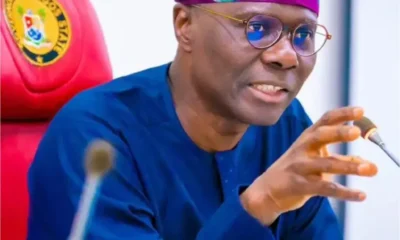

John Hopkins speech: Sanwo-Olu knocks Peter Obi for ‘demarketing’ Nigeria
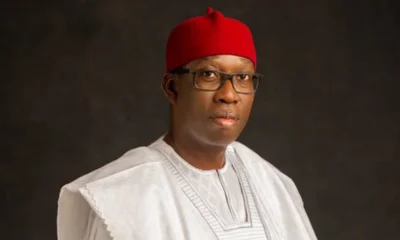

‘Defection was to connect Delta to Abuja’ – Okowa on why he, Oborevwori dumped PDP for APC
Politics
2027: INEC moves to strip president’s power to appoint RECs
Published
2 hours agoon
April 28, 2025By
Ekwutos Blog
Ahead of the 2027 general elections, the Independent National Electoral Commission (INEC) is proposing amendments to Nigeria’s electoral framework that would strip the President of the power to appoint the Resident Electoral Commissioners (RECs).
The proposed change would instead give the commission power to make these appointments, though with a different nomenclature to be known as State Directors of Elections.
The commission is also pushing for the introduction of electronically downloadable voters’ cards to replace the use of Permanent Voter Cards (PVCs).
Specifically, the commission is seeking amendments to Section 14 (3) Paragraph F of the Third Schedule to the 1999 Constitution to confer the power of appointing and disciplining Heads of State and FCT Offices of INEC on the commission.
INEC is also proposing an amendment to Section 6 (3) of the Electoral Act 2022 to confer the power of appointing Heads of State and FCT Offices on the Commission.
According to INEC, these heads of state would be known as State Directors of Elections.
Special Adviser to the INEC chairman, Mohammad Kuna, disclosed this in his presentation at a retreat with the Joint Committee of the National Assembly on Electoral Matters on the reform of the electoral legal framework held in Lagos on Monday.
He said the proposal is essential to promote transparency, accountability, and efficiency in the electoral process.
Currently, the REC is the person in charge of the INEC office at the state level.
The REC, who is assisted by relevant government agencies, undertakes the Presidential, National Assembly, Gubernatorial, and House of Assembly elections in a state and acts pursuant to powers delegated to him or her by INEC’s national Chairman and 12 Commissioners.
Among the duties of the REC is to make available all the materials required to conduct an election. The REC also monitors the activities of all ad hoc staff and provides for the proper verification of election results
Currently, the appointment of RECs, who oversee the electoral process in each state, is within the president’s purview according to Section 154 (1) of the 1999 constitution.
Section 6 (1) of the Electoral Act reads: “There is established in each State of the Federation, Federal Capital Territory and Local Government Area, an office of the Commission which shall perform such functions as may be assigned to it by the Commission.
“(2) A person appointed to the office of a Resident Electoral Commissioner shall
(a) be answerable to the Commission ; and (b) hold office for a term of five years from the date of his or her appointment which may be renewable for another term of five years and no more.
“(3) The Resident Electoral Commissioner appointed under the Constitution may only be removed by the President, acting on an address supported by two-thirds majority of the Senate praying that the Resident Electoral Commissioner be so removed for inability to perform the functions of the office, whether arising from infirmity of mind or body or any other cause, or for misconduct.”
But according to the document presented by Kuna sighted by the Guardian, developments in the recent past and especially during and in the aftermath of the 2023 General election suggest the need for the Commission to have greater powers to make appointments to the heads of State and FCT Offices.
The proposal will also confer on INEC the power to discipline erring RECs.
Aside from this, the commission is also proposing amendments of Sections 77 (2), 117 (1), 132 (5), and 178 (5) of the 1999 Constitution to provide for early, special, Out-of-Country, diaspora, and inmates voting.
The document said this will allow the country to introduce early/special voting to cater for eligible voters on essential services, election personnel, as well as, voters under incarceration, those in the diaspora, and out-of-country voting for eligible Nigerians outside the country during elections.
Another key proposal by INEC is the amendment of Sections 153 (1), 154 (3), 156 (1, a), 157 (2), 158 (1), and 160 (1) and the Third Schedule, Paragraph 15 (b – d) of the 1999 Constitution to create the Electoral Offences Commission and (b) Political Party Regulatory Agency.
The commission is also seeking the amendment of sections 48, 49, 71 and 91 of the 1999 Constitution by Providing New Provisions for Special Seats for Women and PwDs.
“While the Commission should continue to work with all Political Parties for greater participation of under-represented groups in elective positions, the surest way to achieve that objective is through affirmative action.
This should be backed by a clear provision of the law that may, for instance, create designated constituencies for such groups, especially women and persons with Disability.”
The commission is also proposing to the National Assembly to: “Amend Sections of EA 2022 to Remove Ambiguities/Cross-Referencing Errors (a) Section 60 (5) refers to ‘transfer’ of results while 64 (4 & 5) spoke about ‘direct transmission’; (b) Section 64 (4a & 5) refers to 47 (2) with regards the transmission of results; yet 47 (2) makes no reference to the transmission of results; (c) there are similar ambiguities identified in Sections 29 (1), 75 (3) & (4), 77(3), 131 (5) & (6) and 132 (5-10) of the Electoral Act, 2022 detailed in the submission of the Commission.
“Amend Section 65 (1) to Provide Clarity on the Commission’s Powers to Review Election Results. Create a caveat in Section 65 (1) to provide that the triggers to the review of results should be instances of declarations made under duress.
“Review Sections 47 (1) and 16 (1, 2 & 4) on the Design, Printing, Control, Issuance and Use of PVCs. Review Section 47 (1) as well as 16 (1, 2 & 4) to Modify Requirements for the Use of PVCs to allow for the Introduction of Electronically Downloadable Voters’ cards or Any Other Form of ID Acceptable to the Commission.”
Politics
‘Defection was to connect Delta to Abuja’ – Okowa on why he, Oborevwori dumped PDP for APC
Published
3 hours agoon
April 28, 2025By
Ekwutos Blog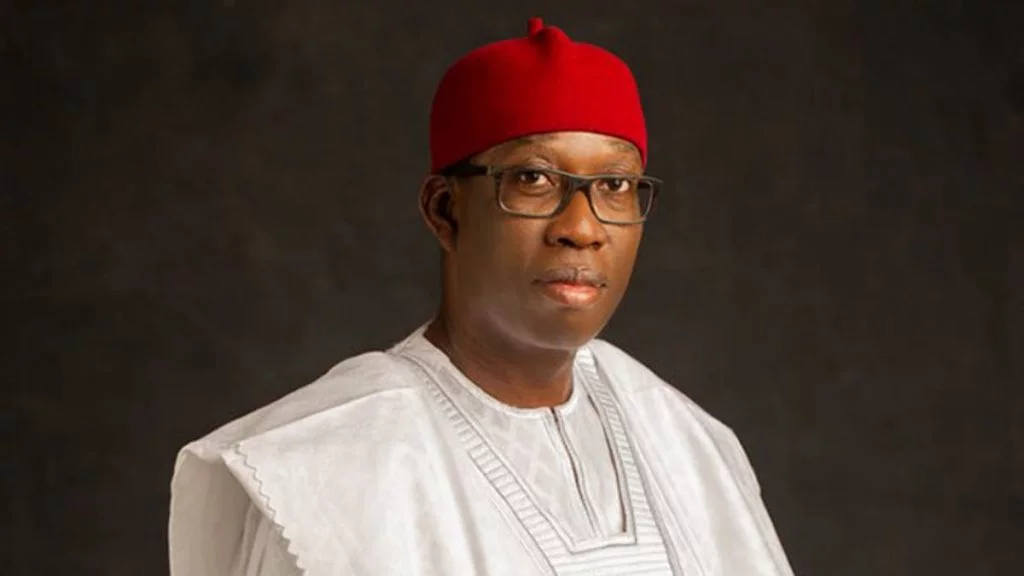
The Peoples Democratic Party, PDP, ex-presidential running mate, Ifeanyi Okowa on Monday explained why he and Governor Sheriff Oborevwori of Delta State defected to the All Progressives Congress, APC.
Okowa said they defected from PDP to APC because they wanted to connect Delta State to the goodwill and resources at the federal level in Abuja.
Last week, Okowa and Oborevwori officially defected to APC, a situation that seems to have unsettled the PDP at national level.
But giving reasons for their defection, Okowa said the move was in the best interest of the state. He spoke during the APC welcome ceremony for the defectors on Monday.
According to Okowa: “When the news broke on Wednesday that we had decided to change our path, people wondered why, but one thing is very important in a people’s history: there is always a time to change their path for the common good of the people.
“As I did tell people that day, it was not about me, it was not about the governor, but the fact that there is a need for us to connect to Abuja, that goodwill that is in Abuja, that resource that’s in Abuja of which Delta State is a large contributor, there was a need to connect to it.
“I was governor for eight years. I was in opposition. I did my best but we lost a lot. And I did not believe that the governor needed to stay working very hard, and we know that we are very supportive of Governor Sheriff because he’s doing a lot.
“But as the governor is doing a lot for us, he also needs to connect to the greater source of power and resource and goodwill in Abuja.”
Politics
Trump administration hints on arresting Supreme Court judges ‘harboring illegal immigrants’
Published
3 hours agoon
April 28, 2025By
Ekwutos Blog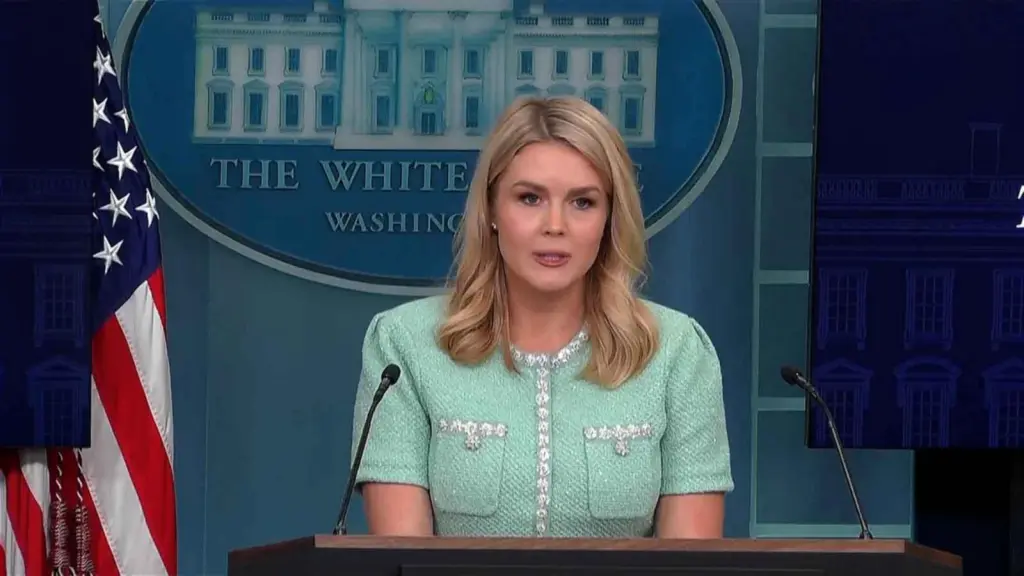
White House Press Secretary Karoline Leavitt on Monday said that the President Donald Trump administration is open to arresting Supreme Court judges if they harbor illegal immigrants.
She stated this while addressing a question from Fox News’s Peter Doocy on the position of some judges regarding illegal migrants in the United States.
The reporter asked, “You guys arrested a Milwaukee County Circuit judge for allegedly helping illegal immigrants get away.
“As you guys look at other judges, would you ever arrest somebody higher up on the judicial food chain, like a federal judge or even a Supreme Court justice?”
Responding to the question, the White House Press Secretary said, “Anyone who is breaking the law or obstructing federal law enforcement officials from doing their jobs is putting theirselvses at risk of being prosecuted, absolutely.”
On the case of the Milwaukee County Circuit judge, Leavitt said the judge “obstructed federal law enforcement who were looking for an illegal alien in her courthouse”.
She stressed that the judge “showed that illegal alien the door to evade law enforcement officials. That is a clear cut case of obstruction”

Fire guts staff quarters at Sa’adu Zungur University, Bauchi

2027: INEC moves to strip president’s power to appoint RECs

EFCC launches probe into $86,500, other foreign currencies seized at Kano airport
Trending

 Trending6 months ago
Trending6 months agoNYA demands release of ‘abducted’ Imo chairman, preaches good governance
- Business6 months ago
US court acquits Air Peace boss, slams Mayfield $4000 fine

 Politics6 months ago
Politics6 months agoMexico’s new president causes concern just weeks before the US elections
- Entertainment6 months ago
Bobrisky transferred from Immigration to FCID, spends night behind bars
- Entertainment6 months ago
Bobrisky falls ill in police custody, rushed to hospital

 Politics6 months ago
Politics6 months agoRussia bans imports of agro-products from Kazakhstan after refusal to join BRICS

 Politics6 months ago
Politics6 months agoPutin invites 20 world leaders
- Politics1 year ago
Nigerian Senate passes Bill seeking the establishment of the South East Development Commission.

